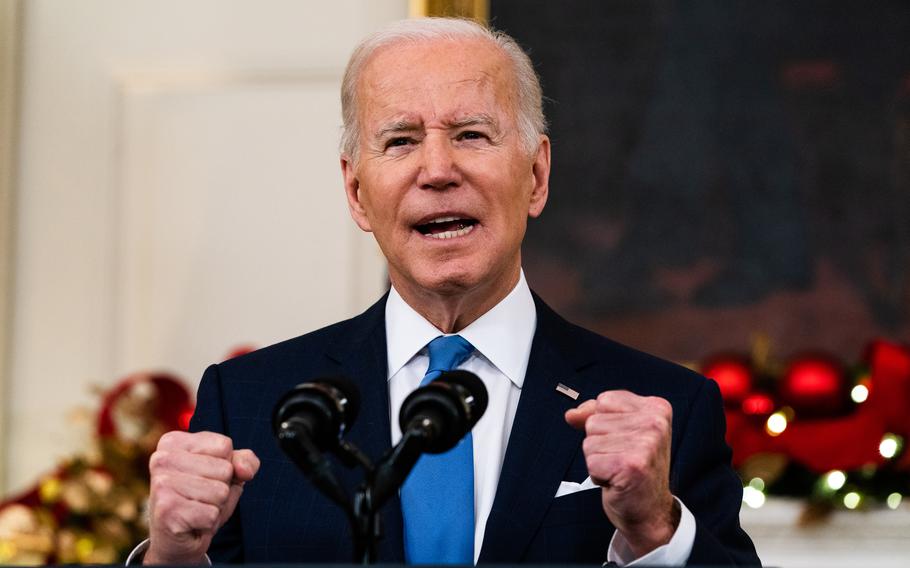
President Biden delivers remarks about the coronavirus at the White House on Tuesday. (Demetrius Freeman/Washington Post)
WASHINGTON - President Joe Biden on Thursday signed into law the Uyghur Forced Labor Prevention Act, a bipartisan bill that bans imports from China’s Xinjiang region unless the importer can prove they were not made with forced labor.
The House and the Senate passed the measure last week. Lawmakers from both parties welcomed Biden’s signing of the law, with Sen. Jeff Merkley, D-Ore., a co-sponsor of the legislation, saying in a statement that it “sends a powerful, bipartisan message that the United States will not turn a blind eye” to China’s violations of human rights.
“The United States must send a resounding and unequivocal message against genocide and slave labor wherever these evils appear,” said Merkley, who is also chairman of the Congressional-Executive Commission on China. “Now that the Uyghur Forced Labor Prevention Act has reached President Biden’s desk and been signed into law, we can finally ensure that American consumers and businesses can buy goods without inadvertent complicity in China’s horrific human rights abuses.”
Biden thanked Merkley and the legislation’s other three sponsors - Sen. Marco Rubio, R-Fla., Rep. Jim McGovern, D-Mass., and Rep. Christopher H. Smith, R-N.J. - as well as House Speaker Nancy Pelosi, D-Calif., and Senate Majority Leader Chuck Schumer, D-N.Y., for their work in pushing the measure forward.
White House press secretary Jen Psaki told reporters on Thursday that U.S. companies “should never feel the need to apologize for standing up for fundamental human rights or opposing repression.”
“As we’ve said before, we call on all industries to ensure that they are not sourcing products that involve forced labor, including forced labor from Xinjiang,” Psaki said at a regular news briefing. “The reality is that companies that fail to address forced labor and other human rights abuses in their supply chains face serious legal risk [and] reputational and customer risks, not just in the United States but in Europe and other regions of the world.”
The legislation applies to “all goods, wares, articles, and merchandise mined, produced, or manufactured wholly or in part” in Xinjiang, a sprawling region in China’s far west where, beginning in 2017, the Chinese government has carried out a mass “reeducation” campaign against Uyghurs and members of other ethnic groups.
Under the 1930 Tariff Act, it is illegal to import into the United States any goods made in whole or in part by forced labor. The new law prohibits all imports from Xinjiang “unless U.S. Customs and Border Protection certifies by clear and convincing evidence that goods were not produced with forced labor.”
Biden’s signing of the law follows a move earlier this year by the Trump administration to issue a sweeping ban on imports of cotton or tomato products from Xinjiang - although enforcement of those sanctions is proving challenging.
Scholars estimate that more than 1 million people in Xinjiang were detained in camps, with some released, some transferred to prison and others pressured to work in factories.
In its annual human rights report released in March, the Biden administration declared China’s treatment of the Uyghurs a genocide, formalizing its dire assessment of Beijing’s campaign of mass detention and sterilization of minority groups in Xinjiang.
China has repeatedly denied that any forced labor has taken place in Xinjiang, although it acknowledges “vocational training programs” for residents whom officials considered susceptible to separatism or religious extremism.
Reasons for detention could include such supposed infractions as wearing a headscarf or a long beard, having more than two children or traveling overseas for vacation.
In a statement Thursday, Pelosi said that with the legislation’s enactment, Biden and Congress “have taken a strong step to combat the exploitation of forced labor in Xinjiang.”
“Congress, on a bipartisan and bicameral basis, will continue to condemn and confront the [Chinese Communist Party’s] human rights abuses in Xinjiang and many other abuses in the region, from Hong Kong to Tibet to the mainland,” Pelosi said. “If America does not speak out for human rights in China because of commercial interests, we lose all moral authority to speak out for human rights any place in the world.”
Rubio called the legislation “the most important and impactful action taken thus far by the United States to hold the Chinese Communist Party accountable for their use of slave labor.”
“It will fundamentally change our relationship with Beijing,” he said. “This law should also ensure that Americans no longer unknowingly buy goods made by slaves in China. I look forward to working with the Biden Administration and my colleagues to ensure the new law is implemented correctly and enforced properly.”